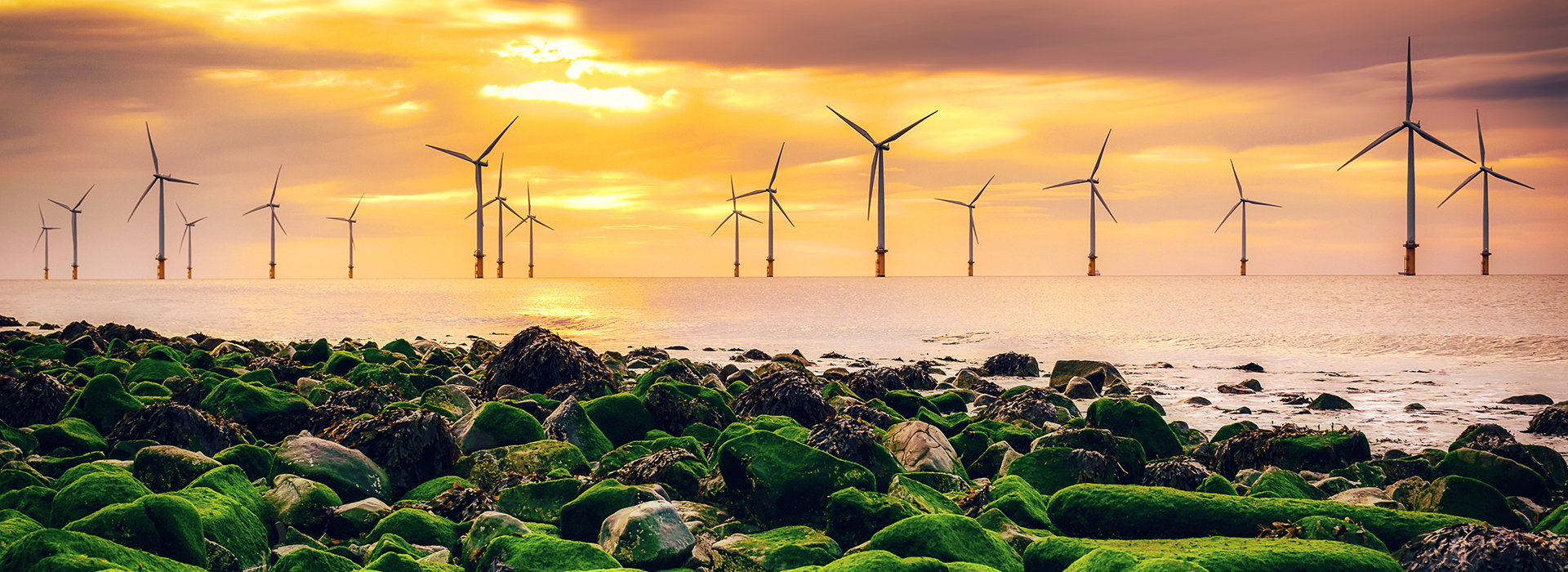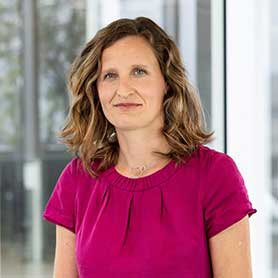Anna Swaithes: Stepping into others' shoes and embracing doughnut economics as a key to advancing sustainability goals
A focus on ethical values, a clear ability to strategise and a passion for putting people and planet before profits have helped guide Anna Swaithes to her current position as Chief Sustainability Officer at The Crown Estate. Now working for an organisation responsible for a prime city and substantial rural portfolio, as well as the seabed and half the foreshore around England, Wales and Northern Ireland, Anna explains why being prepared to step into the boots of others and doughnut economics can help improve sustainability goals.


Anna Swaithes
Chief Sustainability Officer, The Crown Estate
Q.
Your career choices demonstrate a striking passion for protecting people and caring for the planet. How did this evolve?
An initial interest in law and languages gave me a real taste for how ethical and moral principles are applied. I then spent my early career in a small strategy consulting firm which helped develop my strategic skills. During this time, I worked with several leading companies in the food and beverage sector. My work involved travelling to countries such as Brazil, India, and Mexico, where I witnessed the supply chain in action and the key touchpoints big business had. I started to ask lots of questions about the social and environmental impact and felt it was the right time to start working on how to move the dial from profits to people and planet first.
I decided to take a Masters in Sustainable Development. However, before I could start, I was offered a golden opportunity to work on a project for Cadbury who had just set up a partnership to better understand and address the fragility of the cocoa supply chain. I spent a lot of time visiting different countries to appreciate how it all worked. I was horrified by the levels of poverty in the cocoa sector, but also by the potential to make a difference to an industry on which millions of small-scale farmers, as well as several national economies, depended. We built local teams working closely with governments and non-governmental organisations (NGOs). We began working in local communities and supporting them to think differently about the cocoa industry and how they might diversify and start to consider pathways to a better future, particularly for their children.
At this point, I knew that sustainability was the most exciting and meaningful part of business. You grapple with how a company can navigate a path that enables it to achieve better outcomes for people and planet yet remain financially viable. I worked for several years on the cocoa partnership before moving on to a role in the brewing industry, but with similar aims to make outcomes for people and planet the heart of the business and the route to also delivering profits. One of my roles in the brewing industry was to work with agricultural supply chains in Africa to support and strengthen the link between grains grown for brewing, grains for food and sustainable farming practices.
Q.
Changing mindsets and company culture play an essential role in getting businesses to move to a more sustainable model. What steps can companies take to shift the dial?
Companies often shift when there is a burning platform, whether that’s the rising price of raw materials or reputational issues in the supply chain. However, if we really want to change mindsets and business culture, we need to stop using immediate crises as the primary catalyst for change. It’s about understanding the most significant responsibilities organisations have in relation to people and the planet, the real scale of risks if we don’t act, and what opportunities you have to make a difference. Then, apply that philosophy to define the major areas for focus. When you take a deep dive into those concerns, sometimes you may find you are banging your head on a brick wall for a long time on your top concern, whereas number four on your list is the one that motivates people. So, start there, and then come back to the issues that are harder to engage colleagues. It’s about finding a way to hook into a sustainability issue people want to sponsor and drive forward. It also involves investing effort into working out which individuals have agency over some of those big issues. So, with the supply chain, it’s generally the procurement team. It’s then about stepping into their boots to build a shared understanding of sector issues and what synergies exist to move things forward together, rather than working to different agendas. In my current role there is a lot of synergy with the health and safety team because we both share a broad objective - keeping people safe – albeit over different timeframes. We also share a need to shift mindsets and priorities to achieve that objective.
Once you have found the right energy, passion, and interest, you need to keep the conversation going and offer training and workshops. I’ve found most people react better to a positive message about the benefits of putting people and planet first, rather than pushing the negatives. Of course, we must face up to the negatives at some point. However, a purely negative focus tends to lose hearts and minds fast. You need to find a good balance.
“If we really want to change mindsets and business culture, we need to stop using immediate crises as the primary catalyst for change.”
–Anna Swaithes, Chief Sustainability Officer, The Crown Estate
Q.
What are the management tools companies can use to improve sustainability strategies?
I think one of the most important things is being open-minded about the fact that the outcomes we are trying to achieve are not always entirely clear. This will change as science, our knowledge, and our engagement with stakeholders improve. Let us take a leap of faith and be confident that we don’t need to have a perfect outcome in mind. We simply need to know what direction we’re aiming for and what we absolutely cannot let happen, and then keep taking stock of progress and clarity of goals set.
In terms of explaining this concept, I find the theory of doughnut economics useful. The idea is that we focus on social and ecological issues to ensure that we do not overshoot planetary boundaries that protect Earth’s life-supporting systems. At the same time, we must deliver on people’s basic needs. While we cannot know exactly what impact everything we do has on these different planetary boundaries, we can, in principle, work to understand how what we do interacts with those boundaries and people’s needs. It provides a good macro framework for decisions and taking actions to reach net zero and nature recovery goals. It also helps with seeing the whole picture and understanding the objectives and drivers for other people.
Transparent governance is also key. In my current role, decisions and actions taken must be fully justified and demonstrate that they are based on the best evidence available at the time. It’s about being accountable - something we all must get better at.
“Transparent governance is key. It’s about being accountable - something we all must get better at.”
–Anna Swaithes, Chief Sustainability Officer, The Crown Estate
Q.
Companies inevitably face challenges when moving to a more sustainable business model. What do you see as the main talking points?
Firstly, it’s the magnitude, number and urgency of challenges businesses now face. We have nature and climate emergencies, as well as unprecedented levels of social inequality around the world. That’s a pretty overwhelming set of issues for businesses to think about coherently. However, we mustn’t focus on each issue in isolation and instead navigate a path that aims to tackle multiple problems simultaneously. It’s complex, but we have to find whole new business models that contribute to tackling these issues in a sustained and joined-up way, not just pick them off one by one or see them as additional to our core business.
Secondly, I think we are in a place where businesses are increasingly nervous about the backlash on sustainability decisions or positions, they take. So, taking a more collaborative approach can help engage wider understanding of what is being said or done. We need to find common ground and the right levers to influence change internally and externally. Importantly, it is about finding like-minded organisations, setting a common goal, and having a shared vision. The transition to net zero is a good example – it has spawned huge commercial opportunities for renewables and other low-carbon technologies. We need to transfer this thinking and approach to nature and social issues, and to parts of the net zero transition that cannot be as easily achieved through commercialising new technologies.
Thirdly, there is a leadership point. There is so much rhetoric about the arrival of a new generation of leaders with more sustainable priorities. Yet the business structures we have in place have not changed dramatically. Unless we adapt those structures to allow new thinking and practices to emerge up, down and across the business ecosystem, change will be too slow. As it stands, environmental and social problems are moving at a faster pace than the business structures we have in place to deal with those issues.
Q.
Finally, is there a stand-out initiative or action taken in your career that has made a difference?
I am proud of the time the sustainability team I was leading responded and adapted to a real curveball. We had set ambitious objectives for the company, and we were well on our way to achieving successful outcomes when the company was taken over and momentum was lost. It became clear that years of hard work may not culminate in reaching the goals we set out to achieve.
We had a year-long pre-acquisition period, and while it was a tough time, we decided to pivot the work we had undertaken and refocus our energy away from delivering specific sustainability goals to support the individuals within the company to develop and act on their own sense of purpose. We established internal training and entrepreneurial programmes that supported and backed people generating sustainable business ideas. Our work became very much focused on developing individual agency and the ability to go and effect change – whichever organisation they ended up working for.
So many colleagues said this was a surprisingly positive period in their career. They were able to focus on the future and use that experience to influence others. We turned a negative into a positive and made a real difference. I also learnt that leading sustainability is ultimately all about enabling people to make change happen.
“Leading sustainability is ultimately all about enabling people to make change happen.”
–Anna Swaithes, Chief Sustainability Officer, The Crown Estate